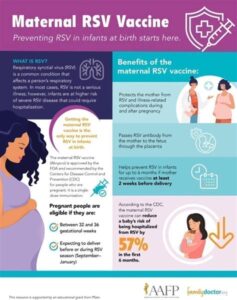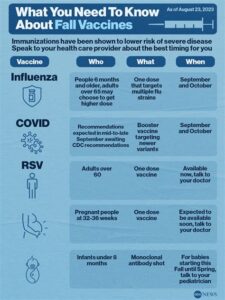Explore the impact of RSV infection during pregnancy, its risks to fetuses, ACOG vaccination guidelines, vaccine efficacy, and effects on infant health outcomes.As respiratory syncytial virus (RSV) continues to pose significant health risks, especially for vulnerable populations, its implications during pregnancy are gaining increased attention. RSV infection can have serious consequences not only for expectant mothers but also for their developing fetuses. Understanding the potential risks to the fetus is crucial, as is the role of vaccination in safeguarding both maternal and infant health. The American College of Obstetricians and Gynecologists (ACOG) has established guidelines regarding RSV vaccination during pregnancy, aiming to minimize the dangers associated with this virus. In this blog post, we will explore the efficacy of the RSV vaccine in pregnant individuals and its impact on infant health outcomes, highlighting the importance of informed decision-making for expectant mothers navigating this complex health landscape.
RSV infection in pregnancy
Respiratory Syncytial Virus (RSV) is a common virus that can lead to serious respiratory illness, particularly in infants and young children. However, the implications of an RSV infection during pregnancy are not as widely understood. Research has shown that pregnant individuals may be at a heightened risk for severe symptoms due to physiological changes during gestation. This article delves into RSV’s potential impact on both the mother and the developing fetus.
Pregnant individuals with an RSV infection can face complications like premature labor, low birth weight, and other adverse outcomes. Research indicates that the virus may contribute to increased hospitalizations, requiring closer monitoring from healthcare professionals. Understanding these risks is critical for ensuring the health and safety of both mother and child during this vulnerable time.
Given the potential for severe outcomes, it is essential for expecting parents to be aware of symptoms associated with RSV. Common symptoms include a runny nose, cough, and wheezing. Pregnant individuals should consult their healthcare providers if they suspect they have contracted the virus or exhibit any concerning symptoms. Preventative measures, including practicing good hygiene and avoiding exposure to sick individuals, can be vit
Potential risks to the fetus
Respiratory syncytial virus (RSV) is a significant concern during pregnancy due to its potential implications for the developing fetus. While RSV infections are often mild in adults, pregnant women who contract the virus may face complications that could potentially affect fetal health.
One of the primary risks associated with maternal RSV infection is the possibility of preterm labor. Studies indicate that pregnant women who develop severe RSV-related illnesses are at an elevated risk of giving birth prematurely, which can lead to a range of health issues for the newborn, including respiratory complications and developmental delays.
Additionally, there is evidence suggesting that maternal RSV infection may be linked to low birth weight. Low birth weight infants are more susceptible to various health problems, including difficulties in breathing and increased vulnerability to infections in their early months. Therefore, it is crucial for expecting mothers to be aware of and take steps to mitigate the risks associated with RSV during pregnancy.
| Risks | Possible Outcomes |
|---|---|
| Preterm Labor | Respiratory issues, developmental delays |
| Low Birth Weight | Increased susceptibility to infections |
ACOG recommendations for vaccination
The American College of Obstetricians and Gynecologists (ACOG) has developed specific guidelines regarding the administration of the RSV vaccine during pregnancy, focusing on the safety and health of both the mother and fetus. These recommendations are particularly essential in understanding the potential benefits of vaccinating pregnant women to protect their infants from respiratory syncytial virus (RSV).
According to ACOG, vaccination against RSV in pregnant women is encouraged during the appropriate trimester, especially for those who are at higher risk due to underlying health conditions.
- Timing of Vaccination: It is advised that pregnant individuals receive the RSV vaccine during their second or third trimester.
- Risk Assessment: ACOG recommends evaluating each pregnant woman’s risk factors to determine if vaccination is necessary.
- Consultation with Healthcare Providers: Pregnant women should have thorough discussions with their healthcare providers regarding the benefits and risks associated with the vaccination.
Furthermore, ACOG emphasizes the importance of monitoring ongoing research regarding the efficacy and safety of the RSV vaccine in pregnant populations. This is vital as new data may lead to updated recommendations that could further guide healthcare providers in making informed decisions for their patients.
Efficacy of RSV vaccine in pregnancy
Respiratory syncytial virus (RSV) is a significant cause of respiratory illness in infants, and its impact can be particularly severe during the early months of life. Therefore, the development of an effective RSV vaccine for pregnant individuals is critical in safeguarding the health of both mothers and their newborns. Recent studies have highlighted the promising efficacy of the RSV vaccine during pregnancy, demonstrating its potential to confer passive immunity to infants.
The rationale behind vaccinating pregnant individuals against RSV lies in the understanding that maternal antibodies can be transferred to the fetus. Research indicates that vaccination can significantly reduce the risk of infants contracting RSV during their vulnerable first months. In fact, clinical trials show that vaccinated individuals produce robust immune responses, which correlate with lower rates of subsequent RSV infections in their infants.
As outlined by the American College of Obstetricians and Gynecologists (ACOG), pregnant individuals are encouraged to receive the RSV vaccine when available. The recommendations emphasize that the benefits of vaccination, particularly in protecting neonates from severe respiratory illnesses, far outweigh the risks. With this proactive approach, healthcare providers can enhance maternal and infant outcomes in populations at risk for RSV-related complications.
Impact on infant health outcomes
Respiratory Syncytial Virus (RSV) poses a significant risk not only to pregnant individuals but also to their newborns. The consequences of RSV infection during pregnancy can influence various aspects of infant health, making it a critical area of study and concern for healthcare providers.
Research indicates that infants born to individuals who have been vaccinated against RSV during pregnancy have improved health outcomes compared to those who were not vaccinated. These benefits can include a reduced incidence of severe respiratory illnesses and lower rates of hospitalizations. The ACOG emphasizes the importance of vaccination in preventing the severe effects of RSV on infants, which can lead to long-term health issues.
Furthermore, the administration of the RSV vaccine during pregnancy can provide passive immunity to the baby, which helps protect them during the vulnerable first months of life. This transfer of antibodies may significantly decrease the risk of contracting RSV. Hence, ensuring that pregnant individuals receive the RSV vaccine can be a pivotal strategy in enhancing infant health outcomes.
Frequently Asked Questions
What is the RSV vaccine and its significance during pregnancy?
The RSV vaccine is designed to protect against Respiratory Syncytial Virus, a significant cause of respiratory illness in infants and young children. Its significance during pregnancy lies in its potential to safeguard the newborn by transferring antibodies from the mother.
Why does ACOG recommend the RSV vaccine for pregnant women?
ACOG recommends the RSV vaccine for pregnant women to reduce the risk of severe RSV illness in infants, especially during the peak RSV season, thereby improving maternal and infant health outcomes.
Can the RSV vaccine be administered during any trimester of pregnancy?
The timing of the RSV vaccine during pregnancy may vary based on specific guidelines, but ACOG typically advises vaccination during the later stages of pregnancy, ideally between 32 and 36 weeks gestation, to ensure optimal antibody transfer.
Are there any side effects associated with the RSV vaccine during pregnancy?
Common side effects of the RSV vaccine during pregnancy may include mild pain at the injection site, fatigue, or low-grade fever. Serious side effects are exceedingly rare, but it’s important for pregnant women to discuss potential risks with their healthcare provider.
How effective is the RSV vaccine in preventing RSV in newborns?
The RSV vaccine has shown promising efficacy in clinical trials, effectively reducing the incidence of RSV-related hospitalizations and severe disease in newborns by providing maternal antibodies.
What should pregnant women discuss with their healthcare providers regarding the RSV vaccine?
Pregnant women should discuss their risk factors for RSV, the timing of the vaccine, potential benefits and risks, and any existing medical conditions that may affect vaccination with their healthcare providers.
Is the RSV vaccine safe for breastfeeding mothers?
Yes, the RSV vaccine is generally considered safe for breastfeeding mothers. Post-vaccination, antibodies may be passed to the infant through breast milk, providing additional protection against RSV.





